China Arts & Entertainment
China Association of Performing Arts Issues Online Influencer ‘Warning List’ with 88 Names
China’s canceled celebrities won’t be able to turn to live streaming once they’re on this black list.
Published
3 years agoon
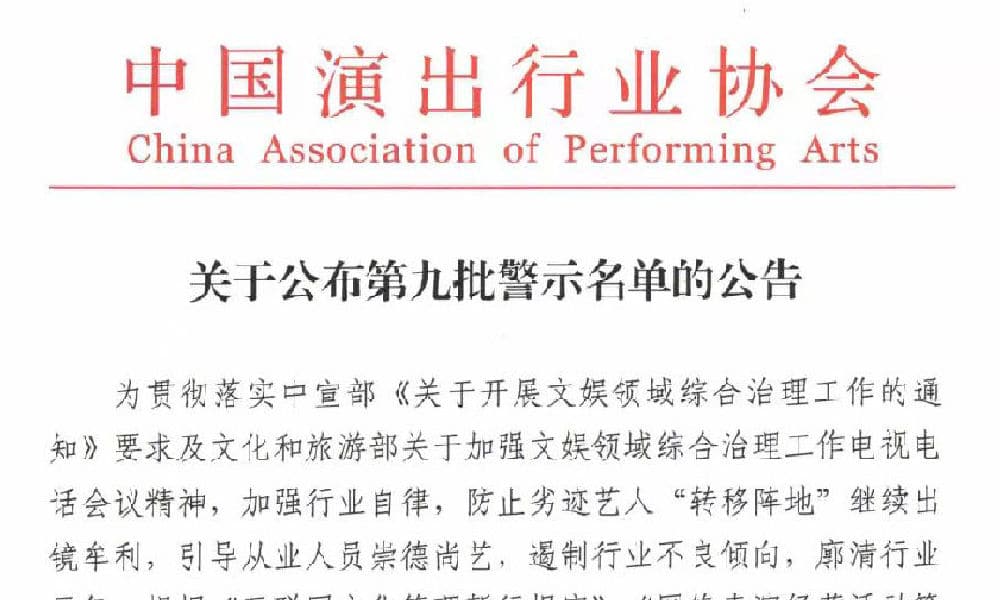
On November 23rd, the China Association of Performing Arts issued a so-called “warning list” of 88 names of internet personalities who have been reported and registered for their bad behavior. The people on the list have either violated the law or their actions have allegedly negatively impacted society and public order.
The moral responsibility of Chinese idols became a much-discussed topic earlier this year when various celebrities came under fire for sexual misconduct, tax evasion, or other controversies.
Chinese celebrities Wu Yifan (吴亦凡, aka Kris Wu), Zheng Shuang (郑爽), and Zhang Zhehan (张哲瀚) are also on the current version of the list. They previously made headlines in China; Chinese-Canadian pop star Wu Yifan was detained over rape allegations, actress Zheng Shuang was caught up in a surrogacy scandal and was fined $46 million for tax evasion, and actor Zhang Zhehan caused controversy over photos of him posing at historically sensitive places in Japan.

Wu Yifan, Zheng Shuang, and Zhang Zhehan.
This is the ninth list issued by the live streaming branch of the China Association of Performing Arts, which first started its “blacklist management system” (“黑名单”管理制度) in February of 2018.
According to an interview by People’s Daily with a spokesperson of the association, they further revised the management system in 2020 and then formed the so-called “Management Measures for the Warning and Return of Online Hosts” (网络主播警示与复出管理办法).
This year, Chinese (online) entertainers have faced tighter scrutiny since China’s Propaganda Department and other authorities have placed more importance on their societal influence as role models.
Although the list issued by the Association’s livestreaming branch focuses on online presenters and bloggers, it also includes other performers who already had a bad record. Chinese celebrities who have faced controversy will sometimes switch from acting or singing to the live streaming industry in order to generate an income. The new measures make it more difficult for ‘canceled celebrities‘ to make a comeback as a live streamer.
This also means we won’t be seeing Zhang Zhehan, Kris Wu, or Zheng Shuang on live streaming channels any time soon, as their inclusion on the list has basically banned them from the industry.
The China Association of Performing Arts issued this blacklist with 88 names of Chinese online celebrities, among them are also Kris Wu, Zheng Shuang, and Zhang Zhehan, whose return to the entertainment circles has now become highly unlikely: https://t.co/jhz6ajiglk pic.twitter.com/mB9ABG95D1
— Manya Koetse (@manyapan) November 23, 2021
Since 2018, a total of 446 online celebrities/streamers have been put on one of these blacklists.
The topic became top-trending on Sina Weibo on Tuesday, where one hashtag page about the list received over 180 million views, and another one – specifically referring to Wu, Zheng, and Zhang being shut out from the industry – receiving over 630 million clicks (#吴亦凡郑爽张哲瀚被封禁#).
Many commenters wondered about why some names weren’t on the list, such as Chen Lingtao (@Cloud_陈令韬), who recently came under fire for cheating. “Of all the 88 people on the list, there are 85 I don’t know,” one commenter said.
Besides the three biggest celebrities, there are also names on the current list such as Tik Tok (Douyin) celebrity Tie Shankao (铁山靠) or online streamer ‘Teacher Guo’ (郭老师). Guo was popular on Tik Tok (Douyin) for rejecting standard beauty norms.
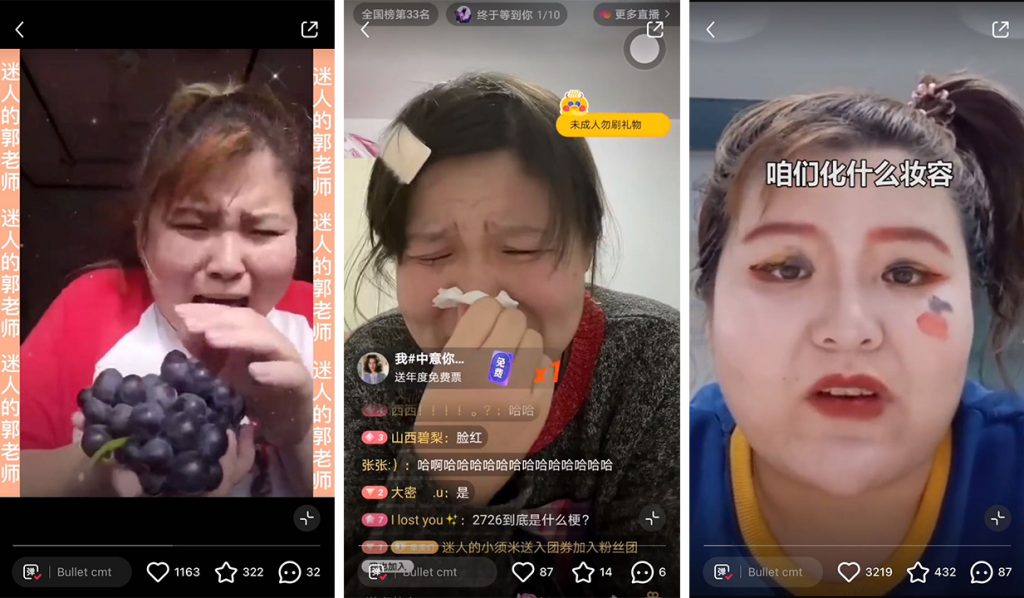
Guo Laoshi (image via Jing Daily).
Guo was removed from Chinese social media in September of this year during the major crackdown on Chinese celebrity circles. Now that she is included on the list together with 87 others, her return to the livestreaming industry is very unlikely.
Update: Read Li Xuezheng Defies Online Celebrity ‘Blacklist,’ Says He’ll Help Zhang Zhehan File Lawsuit
By Manya Koetse
Spotted a mistake or want to add something? Please let us know in comments below or email us. First-time commenters, please be patient – we will have to manually approve your comment before it appears.
©2021 Whatsonweibo. All rights reserved. Do not reproduce our content without permission – you can contact us at info@whatsonweibo.com.
Manya is the founder and editor-in-chief of What's on Weibo, offering independent analysis of social trends, online media, and digital culture in China for over a decade. Subscribe to gain access to content, including the Weibo Watch newsletter, which provides deeper insights into the China trends that matter. More about Manya at manyakoetse.com or follow on X.

Chinese Movies
Why Chinese Hit Movie “Her Story” is ‘Good Stuff’: Stirring Controversy and Celebrating Female Perspectives
China’s end-of-year movie hit, Her Story, is sparking debates and highlighting the rising influence of Chinese female directors.
Published
1 month agoon
December 7, 2024
The Chinese comedy-drama Her Story (好东西, literally “Good Stuff”), directed by Shao Yihui (邵艺辉), has been gaining attention and sparking discussions on Weibo since its late November release in mainland China.
The film features an all-star cast including Song Jia (宋佳), Zhong Chuxi (钟楚曦), Zeng Mumei (曾慕梅), Zhao Youting (赵又廷), and Zhang Yu (章宇). It tells a quirky yet heartfelt story about two women: Wang Tiemei (王铁梅), a self-reliant single mom juggling life and work, and Xiao Ye (小叶), a free-spirited young woman navigating her chaotic relationships.
Their friendship begins when Xiao Ye starts babysitting Tiemei’s nine-year-old daughter, Wang Moli (王茉莉). Xiao Ye introduces her drummer friend, Xiao Ma (小马), to teach Moli how to play the drums, but Xiao Ma’s presence stirs jealousy in Tiemei’s unemployed ex-husband, who schemes to regain his place in the family. Blending humor with poignant insights, the film explores themes of imperfect love, friendship, and the messy process of rebuilding lives.
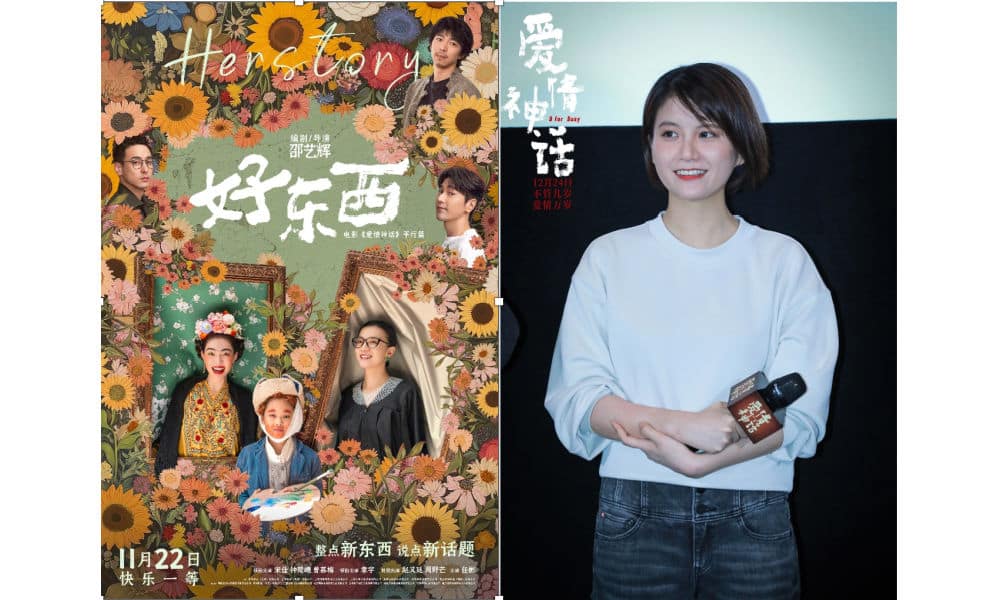
(“Her Story” poster and the director Shao Yihui)
The film also addresses a range of hot societal issues through dialogues woven into everyday interactions, touching on topics like menstruation stigma, sexual consent, feminism, and how family dynamics can impact personal development.
In just eight days, Her Story surpassed 300 million RMB ($41 million) at the Chinese box office (#好东西票房破3亿#). Two days later, on December 2, it exceeded 400 million RMB (#好东西票房破4亿#), and on December 7 news came out that it had surpassed the 500 million RMB ($68.7 million) mark at the box office.
The film also achieved an impressive 9.1/10 rating on Douban, a Chinese platform similar to IMDb, making it the highest-rated domestic film on Douban in 2024.
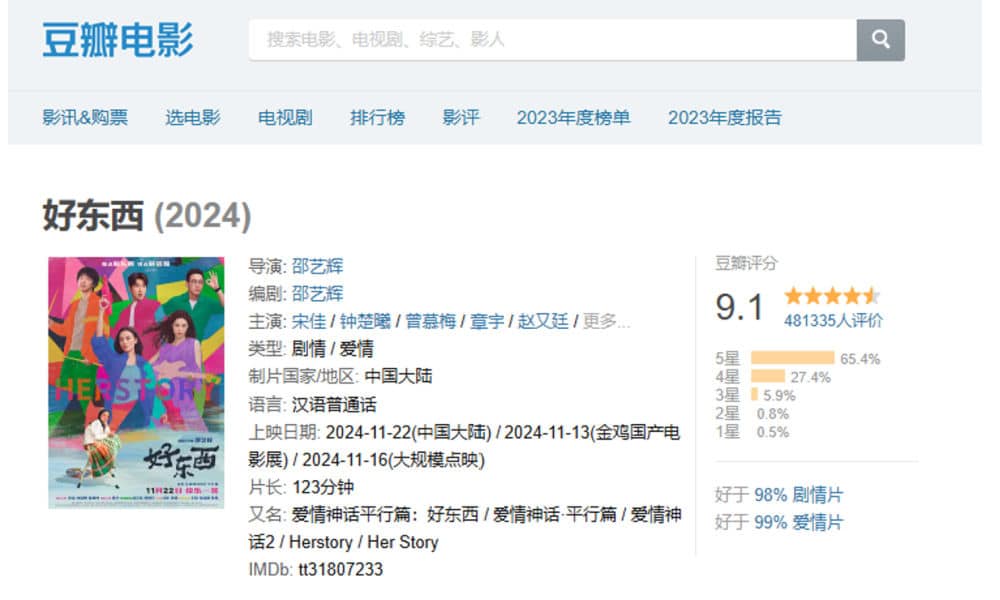
(“Her Story” on Douban)
Notably, 65.4% of voters awarded it five stars, while only 0.5% gave it one star.
Conflicting Views: From Feminist Film to Chick Flick
Despite its huge success, it is almost unavoidable for a movie this big to come without controversy. The film sparked debate on Hupu (虎扑), a platform focused on sports and men’s lifestyle, where it received a lower score of 5/10. While 33.1% of users gave it five stars, 58.4% rated it one star, reflecting divided opinions.
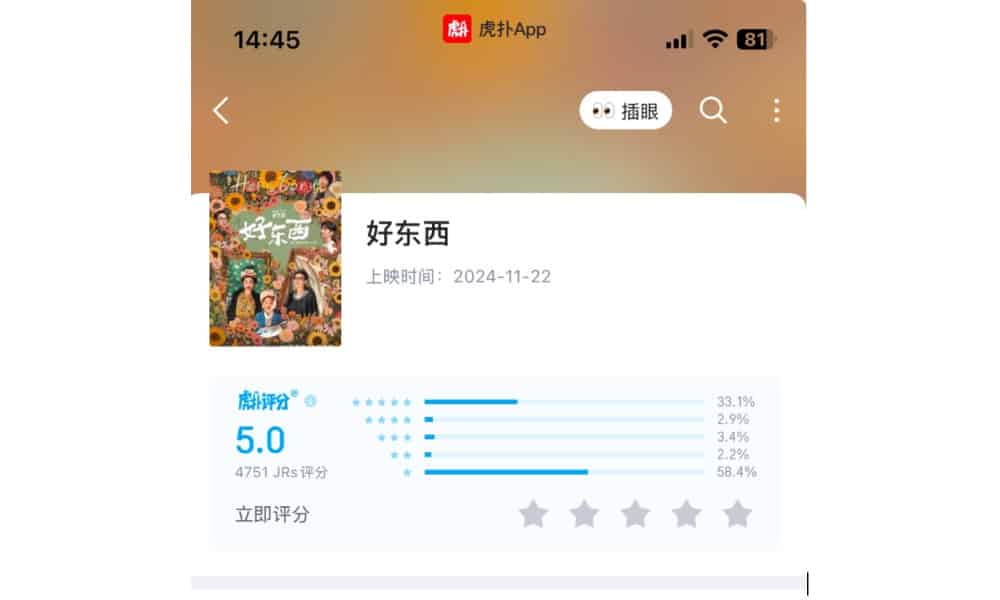
(“Her Story” on Hupu)
Much of the criticism comes from male viewers who feel the film undermines men by portraying them in non-traditional ways and omitting proper names for male characters, such as referring to the ex-husband only as “the ex-husband” (前夫). On the other hand, many female viewers resonate with the film’s female-centered perspective, with one scene blending household sounds and Xiao Ye’s recordings praised as a standout cinematic moment of 2024.
Interestingly, not all women appreciated the film either. A Weibo user, identified as a female scriptwriter for two Chinese TV dramas, emphasized that most of the producers of the film are male. She accused the director of hypocrisy, claiming Shao accepts money and resources from privileged men to create films that encourage female audiences to look down on average men.
She wrote, “I hope that everyone who believes in the ‘ghg’ [girl help girl] myth and supports female idols will also congratulate the male producers who will earn a lot of money from the film.”
Zhou Liming (周黎明), one of China’s most influential film critics, noted two extreme perspectives in film reviews. Some critics label the film as a “boxer film” (拳师电影) or an “extreme feminist film.”
However, the film itself suggests otherwise, as reflected in Moli’s line, “I don’t want to box,” when her father tries to convince her to take up boxing. Some audiences interpreted the line as rejecting extreme feminist messages.
In China, the term “boxer” (拳师) is used to critique certain feminists. The second character in the word for feminists (“权” [quán] in 女权主义者) is pronounced the same as the first character in “boxer” (“拳” [quán] in 拳师). This term often mocks behaviors seen as overly aggressive or lacking nuance in feminist discourse, such as avoiding dialogue or oversimplifying social issues.
Some also dismissed the film as a “chick flick,” a casual term for romantic comedies, which Zhou argued unfairly minimizes its significance. He likened the film to Woody Allen’s Annie Hall, suggesting that, much like Allen’s work, Her Story transcends gender differences and reflects the cultural zeitgeist of its time.
Despite the controversy, the film has been praised by notable figures like actor Zhang Ruoyun (张若昀), who called it “super good, super awesome, and super cute” (“超级好、超级牛、超级可爱的东西”). Zhang described the movie as tackling absurd yet realistic issues from a female perspective with humor and depth.
The Increasing Influence of Female Directors in China
At the end of Her Story, Tiemei’s daughter, Moli, nervously prepares for her first drum performance. Despite her hesitation, she gathers her courage and steps on stage. This moment reminded some viewers of a similar scene in another female-directed film this year, YOLO (麻辣滚烫), where the protagonist gears up for a boxing match.
YOLO is a 2024 comedy-drama directed by Jia Ling (贾玲), starring Jia Ling and Lei Jiayin (雷佳音). A comedic adaptation of the Japanese film 100 Yen Love (2014), it tells the story of Du Leying (杜乐莹), a woman facing personal struggles who turns to boxing after meeting coach Hao Kun (昊坤). Through her journey, she finds a new direction in life after their breakup. Grossing USD 496 million worldwide, YOLO became the highest-grossing Chinese film of 2024.
These parallels between Her Story and YOLO highlight a broader trend: the growing prominence of female directors in Chinese cinema. Beyond the discussions of plot and central themes, Her Story reflects the increasing success and influence of women filmmakers in the industry.
In 2024, female directors have made a notable impact on Chinese cinema, with their films achieving both critical acclaim and box office success. Their works also spark conversations about the need for more diverse perspectives in the industry.
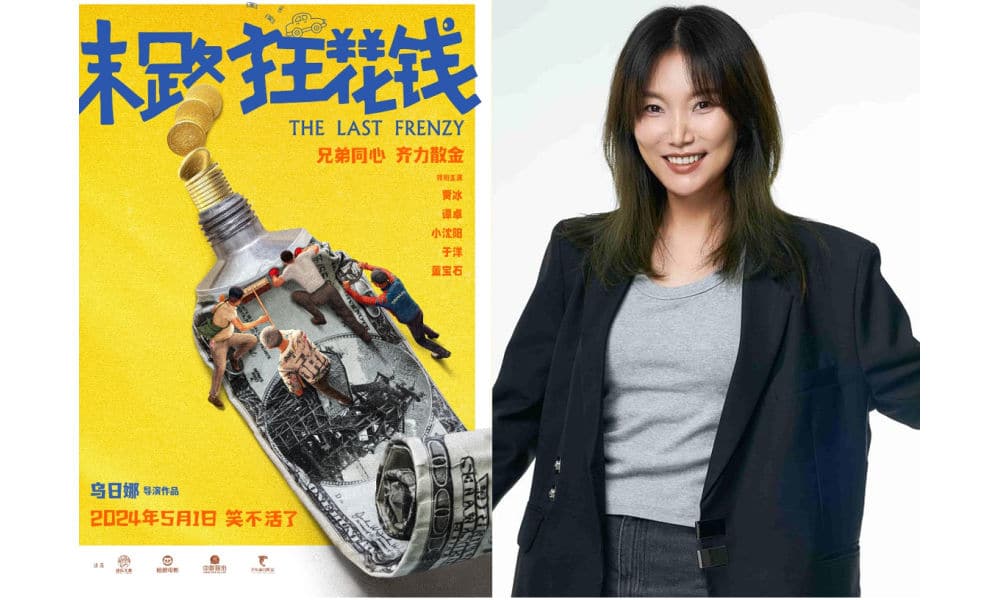
(“The Last Frenzy” poster and the director Wu Rina)
The Last Frenzy (末路狂花钱), directed by Wu Rina (乌日娜), premiered on May 1. This comedy follows Jia Youwei (贾有为), a man diagnosed with a terminal illness, who decides to sell his assets and live fully with his friends. Despite mixed reviews and a Douban score of 5.9, the film grossed over 700 million RMB ($96 million) by May 31, becoming a major box office hit.

(“Stand By Me” poster and the director Yin Ruoxin)
Stand By Me (野孩子, literally “Wild Kids”), directed by Yin Ruoxin (殷若昕), premiered on September 13. Starring Wang Junkai (王俊凯), it tells the story of two neglected children, Ma Liang (马亮) and Xuan Xuan (轩轩), who form a makeshift family while facing life’s challenges. With a Douban rating of 6.7, the film grossed 241 million RMB by October 9.
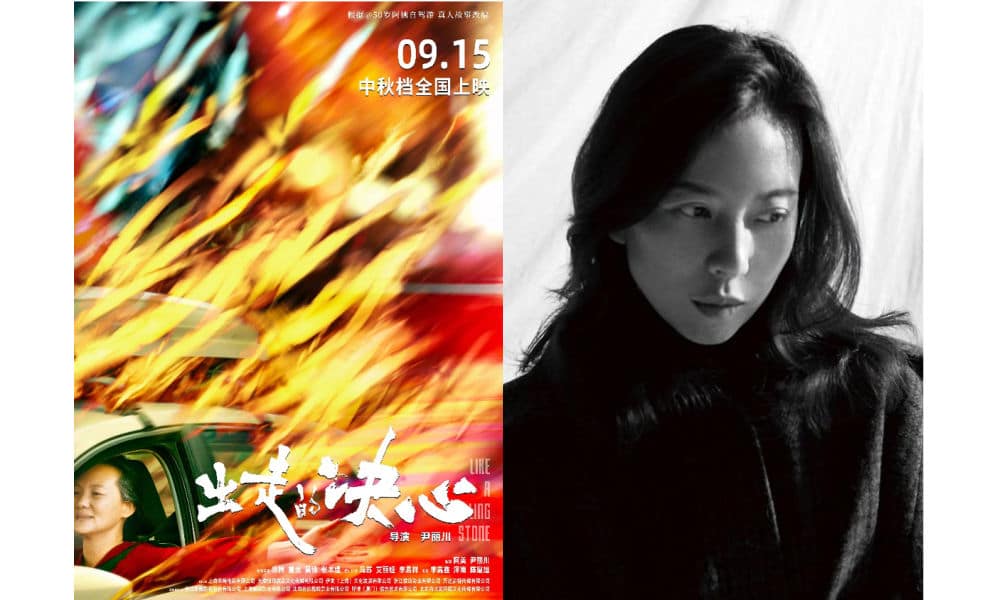
(“Like A Rolling Stone” poster and the director Yin Lichuan)
Like A Rolling Stone (出走的决心, literally “The Determination to Leave”), directed by Yin Lichuan (尹丽川), premiered the same week as Stand By Me. Inspired by Su Min (苏敏), a 50-year-old woman who embarked on a solo road trip, the film explores themes of self-discovery and the struggles of neglected women. Featuring Yong Mei (咏梅), the film earned praise for its authenticity, achieving a Douban score of 8.8 and grossing over 123 million RMB.
To the Wonder (我的阿勒泰, literally “My Altay”), a film-like TV drama directed by Teng Congcong (滕丛丛), adapts Li Juan’s (李娟) memoir. Starring Ma Yili (马伊琍), it tells the story of Li Wenxiu (李文秀), a young woman finding her place in her hometown of Altay after setbacks in the big city. Known for its poetic storytelling and portrayal of ethnic harmony, the series has a Douban score of 8.9 from over 300,000 ratings, ranking among the top dramas of 2024.
“An Era Where Women Are Being Seen”
The growing influence of female directors has sparked discussions about how women’s perspectives are challenging traditional storytelling.
Some Weibo users compared a scene from Her Story, where Tiemei scolds a man for urinating roadside, to a similar moments in YOLO. In YOLO, Hao Kun’s attempt to urinate roadside is humorously interrupted by car headlights. Such scenes highlight how female directors reinterpret everyday behaviors, inviting audiences to question societal norms.
Her Story has already been released in several countries, including the United States, Australia, Germany, and the United Kingdom, with more international releases to follow.
The success of Her Story, the conversations it inspires, and its contribution to highlighting female perspectives in film reflect the evolving dynamics of contemporary cinema and the strengthening of female voices in traditionally male-dominated industries.
On Weibo, many view this as a positive development. One commenter wrote:
“Her Story [好东西/”Good Stuff”] is truly ‘good stuff.’ (..) At the start of this year, I watched YOLO, and at the end of this year, I watched Her Story. Suddenly, I feel very grateful to live in this era—the era where women are gradually being ‘seen.’ Both films hold very special meaning for me. It feels like everything has come together perfectly. I hope to see more outstanding works from female directors in the future, and I look forward to an era where there’s no gender opposition, only mutual equality.”
By Wendy Huang
Follow @whatsonweibo
Edited for clarity by Manya Koetse
Spotted a mistake or want to add something? Please let us know in comments below or email us. Please note that your comment below will need to be manually approved if you’re a first-time poster here.
©2024 Whatsonweibo. All rights reserved. Do not reproduce our content without permission – you can contact us at info@whatsonweibo.com
China Arts & Entertainment
Chiung Yao’s Suicide Farewell Letter: An English Translation
Published
1 month agoon
December 7, 2024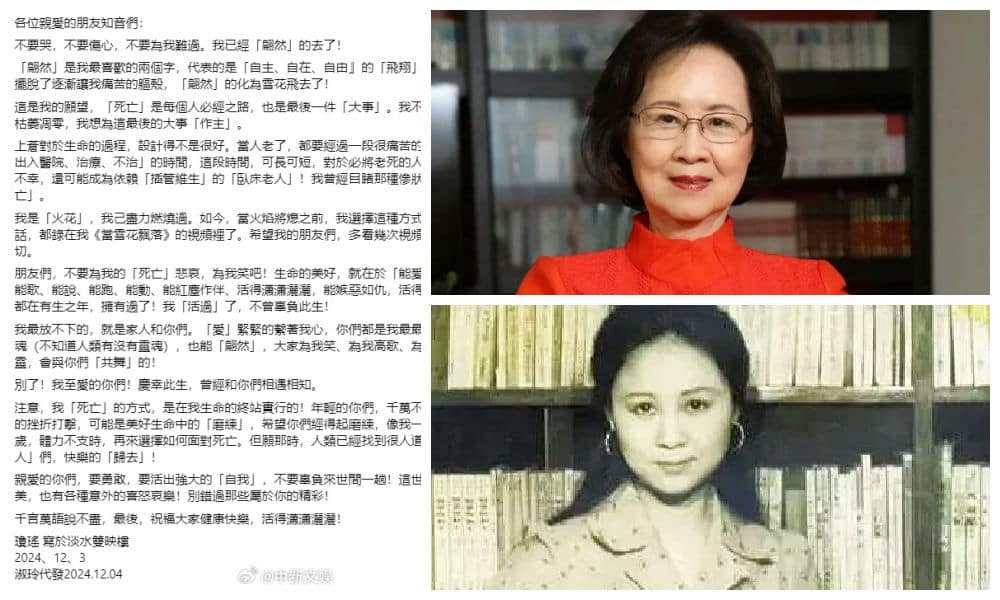
Chinese netizens mourned the passing of Taiwanese writer Chiung Yao (琼瑶) this week. Chiung Yao, one of China’s most beloved romance novelists, passed away at the age of 86.
Among her many works, Chiung Yao is cherished by many netizens in mainland China as part of their collective memories from the 1980s and 1990s. Some of the most iconic Chinese dramas, such as My Fair Princess (also: Return of the Pearl Princess, 還珠格格), were written by Chiung Yao.
On December 4, she was found on her sofa at home, leaving behind a suicide note. The cause of death was determined to be asphyxiation due to carbon monoxide poisoning.
In her farewell letter to loved ones and fans, she wrote the following:
“To all my dear friends:
Do not cry, do not grieve, and do not feel sad for me. I have already fluttered away [翩然 piānrán] effortlessly.
I love the word “翩然” [piānrán]. It represents flying in the air independently, easily, and freely. Elegantly and gracefully, I have shed the body that gradually caused me pain and have ‘fluttered away,’ transforming into snowflakes flying into the sky.
This was my wish. “Death” is a journey everyone must take—it is the final significant event in life. I did not want to leave it to fate, nor did I want to wither away slowly. I wanted to have the final say in this final event.
God has not designed the process of life particularly well. When a person grows old, they have to go through a very painful period of ‘becoming weak, degeneration, illness, hospitalization, treatment, and fatal illness.’ This period, may it be long or short, is a tremendous torment for those who are destined to grow old and die! Worst of all, some may become bedridden, dependent on tubes for survival. I have witnessed such tragedies, and I do not want that kind of “death.”
I am a “spark,” and I have already burned as brightly as I could. Now, before the flame finally dims, I have chosen this way to make a light departure. I have recorded everything I wish to say in my video “When Snowflakes Fall Down” (当雪花飘落). I hope my friends can watch it a few times to grasp everything I wanted to express.
Friends, do not mourn my death but smile for me! The beauty of life lies in the ability to love, hate, laugh, cry, sing, speak, run, move, be together until death parts us, live freely, despise evil with a passion, and live life boldly. I have experienced all these things in my lifetime! I truly ‘lived’ and did not waste this life.
What I find hardest to let go of are my family and all of you. “Love” is what is tightly bound to my heart, and I am reluctant to part with you. To allow my soul (if humans even have souls) to also ‘flutter away,’ please laugh for me, sing loudly for me, and dance in the breeze for me! My spirit in the heavens will dance together with you!
Farewell, my dearest ones! I am grateful for this life, where I had the chance to meet and know you all.
Take note of the way I died: I was at the final station of my life! For those of you who are still young, never give up on life lightly. Momentary setbacks or blows may be the “training” for a beautiful life. I hope you will be able to endure those, as I did, and live to 86, 87.. years old. When your physical strength fades, then decide how to face death. By then, perhaps they will have found more humane ways to help the elderly “leave joyfully.”
Dear friends, be brave, be the greatest version of yourself. Do not waste your journey through this world! Though this world is not perfect, it is filled with unexpected joys, sorrows, and laughter. Don’t miss out on all the wonders out there for you.
There are a thousand more things to say, but in the end, I wish everyone health, happiness, and a life of freedom and joy.”
This translation was previsously published on my X channel here.
By Manya Koetse
(follow on X, LinkedIn, or Instagram)
Spotted a mistake or want to add something? Please let us know in comments below or email us. First-time commenters, please be patient – we will have to manually approve your comment before it appears.
©2024 Whatsonweibo. All rights reserved. Do not reproduce our content without permission – you can contact us at info@whatsonweibo.com.
Subscribe

“Dear Li Hua”: The TikTok/Xiaohongshu Honeymoon Explained

TikTok Refugees, Xiaohongshu, and the Letters from Li Hua

15 Years of Weibo: The Evolution of China’s Social Media Giant

Introducing What’s on Weibo Chapters

Weibo Watch: A New Chapter

The Price of Writing Smut: Inside China’s Crackdown on Erotic Fiction

The Hashtagification of Chinese Propaganda

Controversial Wanghong Livestreamers Are Becoming a Weibo Staple in China

Weibo Watch: “Comrade Trump Returns to the Palace”

The ‘Cycling to Kaifeng’ Trend: How It Started, How It’s Going

Hu Xijin’s Comeback to Weibo

Our Picks: Top 10 Chinese Buzzwords and Phrases of 2024 Explained

The Viral Bao’an: How a Xiaoxitian Security Guard Became Famous Over a Pay Raise

Why Chinese Hit Movie “Her Story” is ‘Good Stuff’: Stirring Controversy and Celebrating Female Perspectives

Chiung Yao’s Suicide Farewell Letter: An English Translation
Get in touch
Would you like to become a contributor, or do you have any tips or suggestions? Get in touch here!
Popular Reads
-

 China Insight9 months ago
China Insight9 months agoThe Tragic Story of “Fat Cat”: How a Chinese Gamer’s Suicide Went Viral
-

 China Music10 months ago
China Music10 months agoThe Chinese Viral TikTok Song Explained (No, It’s Not About Samsung)
-

 China Insight11 months ago
China Insight11 months agoThe ‘Two Sessions’ Suggestions: Six Proposals Raising Online Discussions
-

 China Digital8 months ago
China Digital8 months agoChina’s 2024 Gaokao Triggers Online Discussions on AI





TI
May 2, 2022 at 7:07 am
The China Association of Performing Arts should be subjected to audit and investigation on how they can carry out online “death sentence” without proper investigation and legal process. That is in the case of actor Zhang Zhehan. They are acting as if they are the government, which is not the case. They are nothing mor than a group of self elected organization to trick people into thinking they are the authoritative source, but in reality they are hiding behind the mask of a non-profit organization to manipulate the entertainment industry and build a monopoly influential group.